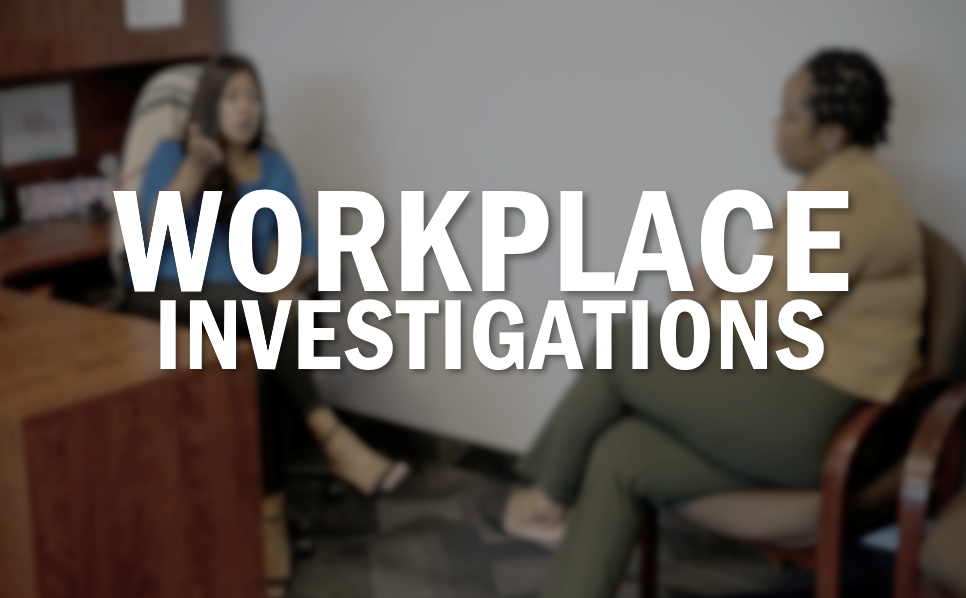
Workplace investigations: Why using a third party is crucial to success
It happens in many organizations: An employee comes to HR to report an incident or pattern of harassment in the workplace, from bullying to racism to sexual harassment. Deciding that engaging a law firm or a professional investigator is too expensive, HR interviews both parties, writes a brief memo, and everything seems to calm down again.
But then, 6 months later, the company is blindsided by a lawsuit from one of the parties. It goes to court, and the company ends up paying tens of thousands of dollars – or even more – because the judge concludes that the investigation was improperly handled from the beginning.
How are internal investigations problematic?
Internal investigations typically fail to hold up for several reasons:- They aren’t sufficiently thorough
- They aren’t properly documented
- Professional investigative techniques are not applied
- Evidence hasn’t been gathered properly – if at all
- Real or perceived bias on the part of investigators (i.e. HR appears to be on management’s ‘side’ or to have a preferential relationship with one or more parties involved)
- Internal politics can influence the outcome
- Confidentiality isn’t maintained
- They don’t meet legislative or legal requirements
Independent investigations are more effective – for everyone
Regardless of industry or role, everyone in an organization has the right to work in an environment that is safe for all workers. Every harassment, violence, fraud or discrimination complaint should be taken seriously and properly investigated. Getting to the truth of a matter should be everyone’s first priority, because that can then inform a suitable response.And while independent, third-party investigations may be advantageous for the employer from a financial perspective, they’re also important for the larger organization as a whole: When employees and stakeholders see that an organization takes appropriate, objective action when a complaint is made, productivity is increased, talent retention improves, and talent acquisition is easier. Most importantly, it’s been demonstrated that taking prompt, effective action reduces the chance that bad behaviour spreads to other areas of the organization.
What do independent investigators bring to the table?
Human Resources investigators can counteract many of the risks involved with internal investigations. Here are the 6 we think are most important.- Real and perceived objectivity: Third-party investigators are independent of the organization and therefore don’t come to the table with pre-existing biases or assumptions of what ‘truth’ looks like. Just as important, engaging a third party to conduct the investigation signals to all stakeholders that the organization is taking the complaint seriously and wants to handle it professionally.
- Timeliness and efficiency: Internal investigations are conducted by employees who have to find time between their daily duties to interview stakeholders, process evidence, prepare documentation and file reports, which can delay an investigation significantly, increasing the chances of lost evidence, foggy memories and mistakes. Independent investigators, on the other hand, are able to be focused, efficient and singular in their approach, meaning that there is less risk to evidence.
- Interviewing expertise: Professional investigators have years of training and experience in deception training, how to conduct fact-finding interviews, and how to handle complainants, respondents and witnesses – all of whom need to be handled differently in every investigation. From setting up the interview room appropriately and developing rapport, to properly structuring questions and follow up, trained workplace investigators are more likely to uncover the facts of a situation. (It’s also important to remember that investigators are often specialists in their fields, with subject matter expertise in specific types of complaints.)
- Effective documentation and reporting: One of the most common reasons that workplace complaints can end up in lengthy litigation is that the initial investigation was insufficiently documented, and no comprehensive report was provided to the complainant. (This can be particularly damaging in union-related cases, where there are often additional requirements that must be satisfied.) Professional, independent investigators are required to provide thorough, comprehensive and impartial documentation throughout the process, from initial complaint, to subject and witness interviews, as well as for any evidence that is collected, along with supporting data. Not only does this documentation ‘hold up in court’, it can prevent a case from ending up there, by making mediation and settlements easier.
- Privacy and confidentiality: Even the best workplaces can be hotbeds of gossip, and when a serious allegation has been made, it often seems like the rumour mill goes into overdrive. Sensitive information can become public, or misinformation can be taken as fact, damaging the organization, individuals, and productivity. A third-party investigator helps to control the flow of information and the number of employees who may have access to highly sensitive information. This can also alleviate internal hierarchies (i.e. ‘who gets to know’ and how that information may be wielded) by putting the information in the hands of an objective third party who has a professional duty to act responsibly.
- Actionable recommendations: Investigators’ insights around critical improvements, gap identification and risk management mean they can provide practical, actionable recommendations that the organization can implement to ameliorate the current situation and prevent it from reoccurring.